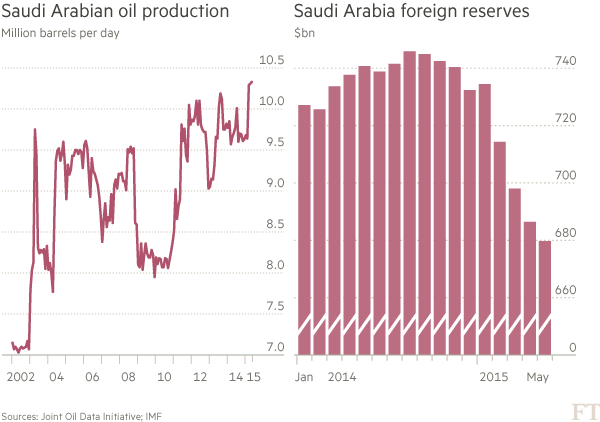Renminbi falls again, a year without polio and robots 2.0

Stay up to date:
Economic Progress
The daily briefing “FirstFT” from the Financial Times.
The renminbi fell sharply again on Wednesday, taking it to a new four-year low against the US dollar in offshore markets and fuelling expectations of sustained weakness in the Chinese currency.
The People’s Bank of China lowered the daily fix around which its currency trades against the dollar by 1.6 per cent on Wednesday morning, the second biggest one-day cut since the country abandoned its hard currency peg in 2005. (FT)
In the news:
Preparing for the worst
An influential group of former military leaders and politicians has put out a stark warning: Russia and Nato are training for a full-blown confrontation. The assessment comes amid increased military posturing by both sides in recent months. (FT)
Great expectations
Google defied a wider stock market sell-off on Tuesday, closing 4.1 per cent higher as investors welcomed the promise of more openness about the profitability of its core search advertising business. (FT)
Opec’s oil gush
Saudi Arabia scaled down its production from record levels last month even as rival Opec members helped push the group’s output to its highest level since 2012. Here is a look at the new oil order, in charts. (FT)
GE to sell healthcare unit
General Electric has taken another big step in unwinding its finance arm by agreeing an $8.5bn sale of its healthcare unit to Capital One, one of the fastest-growing US banks. With total assets of $311bn at the end of June, the bank is among a group of second-tier lenders to have built aggressively since the end of the financial crisis. (FT)
‘Missile parts’ found at MH17 crash site
Dutch investigators say the parts, possibly from a Buk surface-to-air system, are “of particular interest” and could reveal who was behind the aircraft crash that killed 298 people on land held by Russian-backed rebels. (BBC)
It’s a big day for:
Greece, which has struck an outline deal with creditors on the terms of a new EUR86bn rescue package, marking a breakthrough before a crucial August 20 deadline for its next big debt repayment. (FT)
Alibaba, which is set to announce earnings for the first quarter before US markets open. Analysts do not expect the Chinese ecommerce group to deliver outstanding results, in part due to one-off changes that are expected to shave revenue growth. (WSJ)
Food for thought:
A year without polio
Health experts around the world are quietly celebrating a significant milestone: it has been one full year since polio was detected anywhere in Africa. “This is a big success but it’s still fragile. There’s always a worry that there could be an undetected case in a population you’re not reaching,” said Hamid Jafari of the WHO. (NYT)
Textbook history lessons
At a time of rising regional tensions, China, Japan and South Korea remain haunted by a bitter shared past. Today, school textbooks and patriotic memorials are at the forefront of a new battle between competing nationalisms. (FT)
Breathable booze
A London pop-up bar is upending centuries of drinking convention by doing away with the glasses. Instead, it is using a humidifier to pump gin and tonic vapour into a closed space, which patrons then absorb into their bloodstream simply by breathing. (AP)
Robots 2.0
Researchers from Cambridge and Zurich have developed a robotic system that can evolve and improve its performance. The robot builds other robots – each one better than the previous generation – in a project aimed at developing machines that can adapt to their surroundings. (BBC)
India’s war on Greenpeace
A look at the Modi government’s attempts to dismantle, destroy and otherwise muzzle NGOs, nearly 9,000 of which have seen their licences cancelled since last May. “Even within this hothouse of hostility, no organisation has been lavished with as much unwelcome attention as Greenpeace.” (The Guardian)
Video of the day:
Hard landing – or worse?
John Authers reports from New York on a relatively muted, but negative, reaction to China’s devaluation. The critical questions: will any subsequent decline be orderly, and is China’s economy facing a hard landing – or a crash? (FT)
This article is published in collaboration with The Financial Times. Publication does not imply endorsement of views by the World Economic Forum.
To keep up with the Agenda subscribe to our weekly newsletter.
Author: FirstFT is the Financial Times’ editors curated free daily email of the top global stories from the FT and the best of the rest of the web.
Image: A 100 yuan banknote (bottom) is placed next to U.S. $100 banknotes in this picture illustration taken in Beijing, November 1, 2010. REUTERS/Petar Kujundzic
Don't miss any update on this topic
Create a free account and access your personalized content collection with our latest publications and analyses.
License and Republishing
World Economic Forum articles may be republished in accordance with the Creative Commons Attribution-NonCommercial-NoDerivatives 4.0 International Public License, and in accordance with our Terms of Use.
The views expressed in this article are those of the author alone and not the World Economic Forum.
Related topics:
Forum Stories newsletter
Bringing you weekly curated insights and analysis on the global issues that matter.
More on Emerging TechnologiesSee all
Robin Pomeroy and Lukas Bester
May 29, 2025
Naala Oleynikova
May 28, 2025
Nilmini Rubin
May 28, 2025
Bastian Nominacher and Kiva Allgood
May 23, 2025






